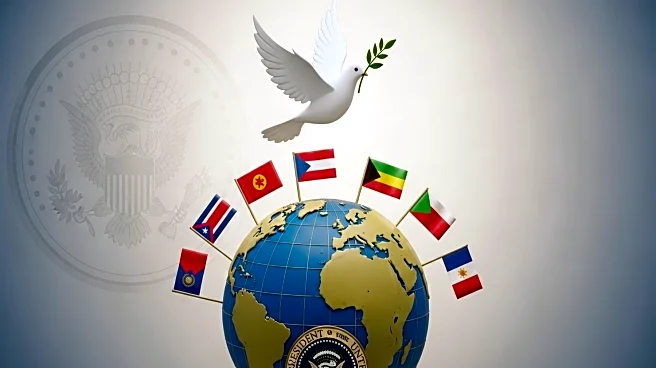What is the story about?
What's Happening?
President Trump, along with leaders from Egypt, Qatar, and Turkey, signed a plan aimed at ending the conflict between Israel and Hamas in Gaza. The signing ceremony notably did not include representatives from the two warring parties. The plan is part of a broader effort to establish peace in the region, with Trump announcing that the second phase of negotiations between Hamas and Israel is underway. The agreement follows the release of hostages from Gaza, although the search for victims' bodies continues. The Israel Defense Forces reported the return of coffins of four Israeli hostages, while Hamas agreed to release hostages in exchange for the release of 250 prisoners by Israel. Of these prisoners, 154 were deported to Egypt, while others were relocated to the West Bank, Jerusalem, and Gaza. Despite the agreement, there are differing views between Trump and Israeli Prime Minister Benjamin Netanyahu on whether the fighting has truly ended.
Why It's Important?
The signing of the ceasefire plan is a significant diplomatic move that could potentially stabilize the region and reduce ongoing violence. The involvement of President Trump and other world leaders underscores the international interest in resolving the conflict. The release of hostages and prisoners is a critical step towards peace, although the absence of direct participation from Israel and Hamas raises questions about the plan's effectiveness. The differing statements from Trump and Netanyahu highlight potential challenges in achieving lasting peace. The situation impacts U.S. foreign policy and its role in Middle Eastern diplomacy, with implications for regional stability and international relations.
What's Next?
The next steps involve continued negotiations between Hamas and Israel, as indicated by President Trump. The focus will likely be on ensuring the return of all deceased hostages and addressing the demands of the Hostages and Missing Families Forum. The Trump administration's approach to the situation may evolve, depending on developments in the region and responses from key stakeholders. The international community will be watching closely to see if the ceasefire leads to a sustainable peace agreement.
Beyond the Headlines
The ceasefire plan raises ethical and legal questions about the treatment of hostages and prisoners, as well as the broader implications for human rights in conflict zones. The deportation of prisoners to Egypt and other locations may have long-term effects on regional dynamics and the lives of those involved. The absence of direct participation from Israel and Hamas in the signing ceremony suggests potential challenges in implementing the plan effectively.














